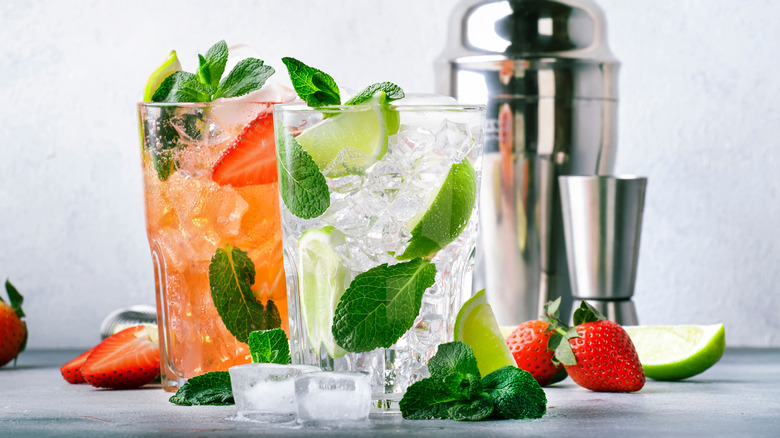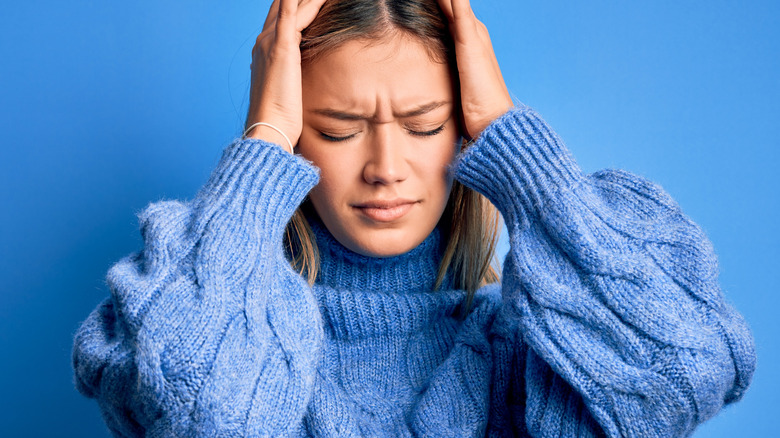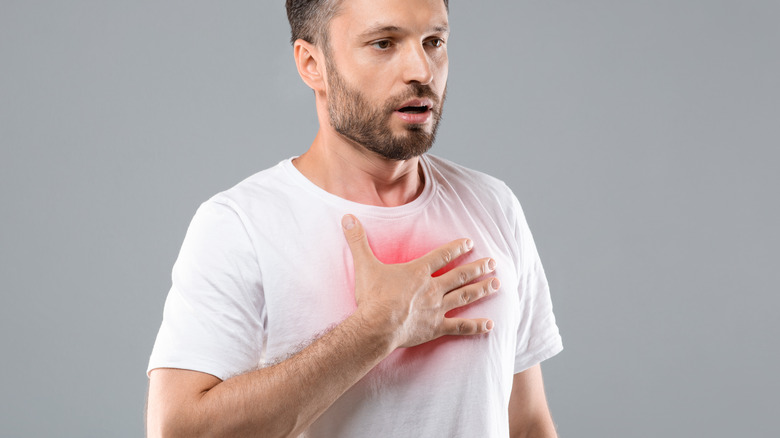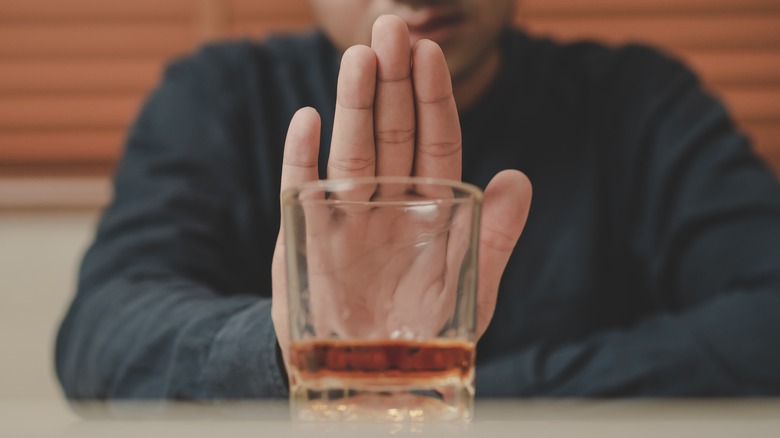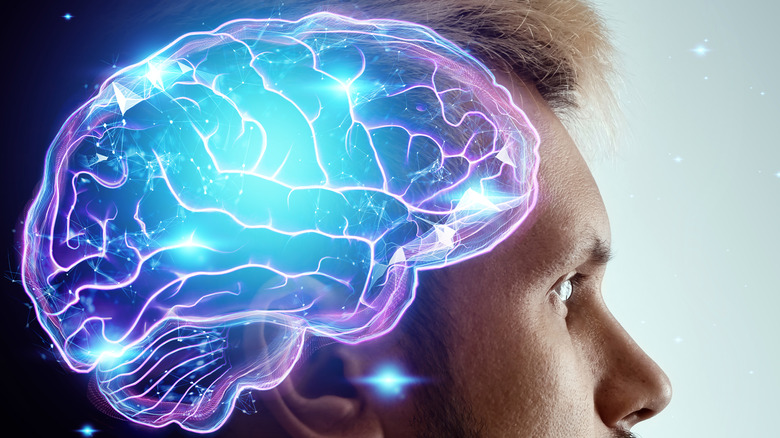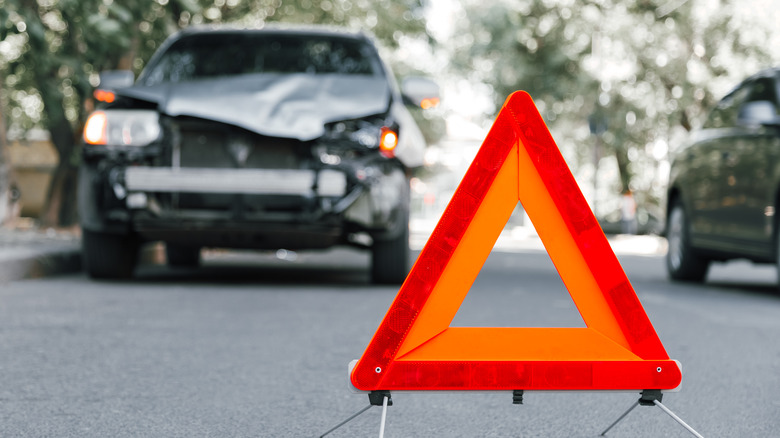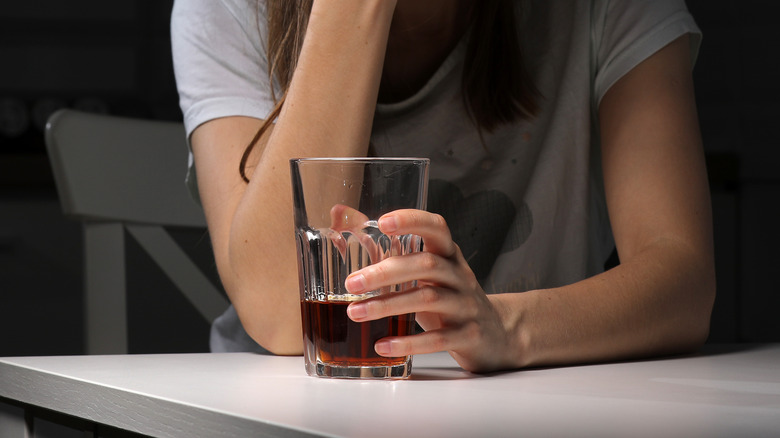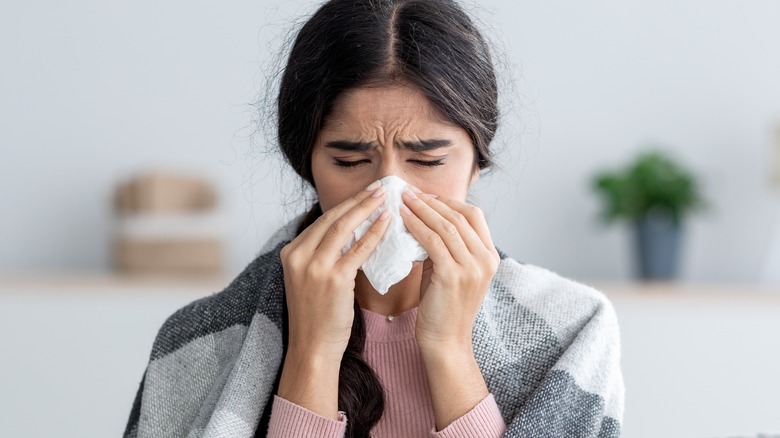The Real Effects Alcohol Has On Your Body
Alcohol is prevalent in many parts of daily life. A nice meal at a restaurant can be paired with wine or a signature cocktail. At a sports game, you might enjoy a cold, frosty beer. Champagne toasts are part of many celebrations, from birthdays to weddings.
Alcohol comes in many different forms, but there's a measurement for one standard drink. In the United States, 0.6 fluid ounces or 14 grams of pure alcohol is considered a standard drink, according to the National Institute on Alcohol Abuse and Alcoholism. That equals roughly a 1.5-ounce pour of hard liquor, 5 ounces of wine, 8-9 ounces of malt liquor, and 12 ounces of a regular beer. The amount of alcohol varies depending on the drink, so it's important to check the amount of alcohol you're consuming if possible. For example, light beers can have about 85% the amount of alcohol that a regular beer has.
Alcohol can enhance an evening out, but it also creates unwanted consequences in your body. Here are a few of them.
Alcohol is a depressant
A depressant is a type of drug that reduces arousal and stimulation, according to the Alcohol and Drug Foundation. Alcohol is categorized as a depressant, but that doesn't mean it makes you feel sad. It simply means that alcohol slows down the messages that pass between your brain and body. At high doses, it can depress the nervous system, which is why it's referred to as a "sedative hypnotic" (per New Zealand's Health Promotion Agency).
In small doses, a depressant such as alcohol can make someone feel more relaxed. It decreases inhibitions, which means that you tend to restrict yourself less. They can also help you sleep, reduce anxiety, reduce muscle spasms, and prevent seizures, according to the Department of Justice's Drug Enforcement Administration. Other depressants include benzodiazepines and kava, as well as some sleep aid medications. Taking more than one depressant at a time can exacerbate the effects of each, and is dangerous.
Alcohol is also a stimulant
Although seemingly counterintuitive, alcohol can be a stimulant. Even though it primarily acts as a depressant, low doses of alcohol can increase talkativeness and euphoria (per New Zealand's Health Promotion Agency).
A paper published in Current Topics in Behavioral Neurosciences acknowledged that it's not clear how the effects of alcohol should be defined. The authors mention that some people have an increased heart rate and levels of aggression when they drink, which is a sign of stimulation.
On the other hand, as signs of stimulation appear, so do signs of depressant activity like motor slowing and cognitive impairment. In other words, depressant and stimulant activity increase at the same time. The authors explain that dopamine release is related to the stimulant effects of alcohol, but the changes that occur in the brain aren't fully understood. They also mention that people who experience a higher stimulant-like effect from drinking alcohol are at a higher risk for developing addiction.
Alcohol can cause heart problems
Drinking alcohol can be bad for your heart, but it depends on how much you drink and for how long.
It's possible to damage your heart with only one instance of heavy drinking, says the National Institute on Alcohol Abuse and Alcoholism. You can also cause damage from extended periods of heavy drinking. One issue you can run into is cardiomyopathy, which is a stretching or drooping on the heart muscle. According to the Centers for Disease Control and Prevention (CDC), cardiomyopathy can cause the walls of the heart to stiffen or become thinner.
Arrhythmia, which is another way of saying irregular heart beat, can be caused by heavy drinking. An arrhythmia can mean that your heart is beating too fast or too slow, explains MedlinePlus. Stroke and high blood pressure are two other heart problems that can arise from drinking. A stroke can be deadly, and is the 5th leading cause of disability in the United States, according to the American Stroke Association.
Alcohol can damage the liver
The liver handles the difficult task of filtering toxins out from the bloodstream, says the U.K.'s National Health Services (NHS). It also helps you digest food, balances blood sugar levels, and keeps you healthy by fighting infections and diseases. When you drink, your liver works hard to filter alcohol out of your blood stream. In the process, liver cells die and need to be regenerated.
While it can mostly handle the rigors of filtering your body, the liver sometimes sustains damage or becomes inflamed. One possible condition (via the National Institute on Alcohol Abuse and Alcoholism) is steatosis, which means fatty liver. If you drink a lot, even over the course of just a few days, you can build up fatty deposits in your liver. Over time, with excessive drinking, you can also develop alcoholic hepatitis, fibrosis, and cirrhosis. The primary treatment for these alcohol-related liver problems is to stop drinking.
Alcohol impairs your cognitive function
Alcohol creates changes in your brain that influence things like your behavior and ability to think. Experts at the Gateway Foundation enumerate some of the ways that alcohol decreases some of your cognitive functions.
For instance, when you drink alcohol, you're worse at making decisions. This can make you a worse driver, for example, because you don't react properly to situations on the road. It can also make you reckless and impair your memory. Even people who drink moderately experience shrinking of brain areas that influence thinking and learning abilities.
Heavy drinkers can experience a loss of memory and develop occasional confusion. They're also more susceptible to seemingly unrelated mental health problems such as depression, anxiety, and restlessness. The brains of heavy drinkers have decreased gray matter, and they lose the ability to think abstractly. You're also more likely to develop a dangerous brain disease called Wernicke-Korsakoff syndrome if you drink heavily for a long time.
Alcohol changes your brain chemistry
Many of the changes you experience when you drink come from changes in brain chemistry. Your brain has a vast network of neurons and chemicals that create changes in your body and mind. One of the changes that occurs from drinking, according to an article from the Gateway Foundation, is a reduced effect of glutamate. Alcohol, which can act as a depressant, reduces the activity of glutamate in your brain. Doing so makes you tired and sleepy.
While it's depressing the activity of glutamate, alcohol is actually increasing something called GABA in your brain. Normally, it has calming effects on your brain, but when mixed with alcohol, its effects are magnified.
Dopamine is another chemical that alcohol alters. It increases the amount of dopamine you have in your brain, which is thought of as a reward chemical. However, over time, drinking can cause you to stop producing as much dopamine naturally.
Alcohol increases breast cancer risk
There is a substantial body of evidence that shows a link between alcohol and breast cancer risk (via the Harvard T.H. Chan School of Public Health). To put it simply, the more alcohol you drink, the higher your risk for developing breast cancer.
A possible reason for the dramatic increase in risk is from a lack of folate. Folate or folic acid is also known as vitamin B9, and is simply the supplemental form of filate. When you don't get enough folate, some of the genes in your body can change and increase your risk for developing cancer.
Folate plays an important role in your body. It's involved in the creation of new cells, and it also helps prevent changes in your DNA. However, you can supplement with folate by taking 400 milligrams per day, which can decrease your risk for developing breast cancer. Another problem with drinking is that it increases your estrogen levels, which is a primarily female hormone that can hasten the growth of cancer cells.
Alcohol can cause weight gain
Even though it's a liquid, alcohol packs a punch in terms of the amount of calories each drink contains. In fact, an article from the Harvard T.H. Chan School of Public Health estimates that a regular drink is between 100 to 150 calories.
Cocktails can have even more calories, since they often contain extra additives like sugar, syrup, and soda. If each drink contains 150 calories, 3 drinks per night would add an extra 450 calories to your daily intake, which is a significant amount for many people. Another problem with alcohol is that it lowers your inhibitions. This can make you more likely to eat food that's high in calories but not very healthy, such as fried foods an sweet desserts.
However, not all people who drink are destined to gain weight. A study from Current Obesity Reports found that the effects of alcohol on weight gain are varied. Some people are able to continue to drink moderately without gaining weight, while others are not.
Alcohol impairs driving ability
Alcohol changes your brain chemistry and makes it harder to think. It also changes your motor function.
Some of the things you do in life require a surprising amount of thinking and coordination. One of those things is driving. You need sharp reflexes and the ability to think to avoid potentially dangerous situations when you're on the road. Alcohol can rob you of the ability to do so properly, which is why drinking and driving is so dangerous.
An article from Northwestern Medicine explains that you don't need to drink too much to experience impaired driving ability. Drinking decreases your judgement, so that you think you're fine to drive. If you have a blood alcohol concentration of 0.08 or more, you're 11 times more likely to be killed in a car crash than people who haven't had any alcohol. Blood alcohol concentration, or BAC, refers to the amount of alcohol that you have in your system (via Stanford University).
Alcohol can damage your digestive system
Drinking alcohol takes its toll on your digestive system. Alcohol is consumed by drinking, which means that it has to pass through your stomach and intestines.
An article from the American Addiction Centers says that alcohol can damage the lining of your stomach, which protects the stomach from acid that it produces to digest food and liquids. When the stomach lining is damaged, ulcers can develop.
People who drink too much may also develop nutrient deficiencies. This is at least in part due to the effects that alcohol has on your digestive system. Drinking can actually blunt your ability to break down and digest foods, which means that you're not getting the nutrients out properly. Additionally, this can make it hard to transport and store nutrients. For example, excess alcohol intake can cause thiamine deficiency. It can also make it more difficult for your body to regulate blood sugar levels.
Alcohol can cause reproductive issues
Men and women can experience different and similar reproductive and sexual side effects from drinking. In general, alcohol lowers your judgement and inhibitions, which means you're more likely to engage in risky sexual behavior.
Men and women can both develop fertility problems in the long term, per the American Addiction Centers. People who want to have children should consider drinking less or quitting altogether. From drinking, men can experience sexual problems like erectile dysfunction, while women can experience irregular menstruation.
Women who are pregnant face serious side effects from drinking. The risks of having a miscarriage are higher, as are the risks of having a stillbirth. Another problem that can come from drinking during pregnancy affects the development of the child. It's called fetal alcohol spectrum disorder, which is a group of conditions that can occur in a person who was exposed to alcohol before birth (via the CDC).
Alcohol can cause dependency
Drinking is not inherently bad, nor is it automatically the sign of a problem. If you have no more than two drinks per day, you're considered a moderate drinker, according to the American Psychological Association. However, people who drink too much and too frequently can develop alcohol dependency. This is also known as alcoholism. Someone who's dependent on alcohol has trouble controlling how much they drink. They might find it difficult to stop once they've started.
Part of the problem with dependency is that your tolerance for alcohol increases as you drink more. Similar to other drugs, it gets harder to get the same "high" from alcohol and you need to drink more. If you suddenly stop drinking once you've become dependent, you can experience withdrawal symptoms. Symptoms of withdrawal can be as mild as nausea and as severe as hallucinations or convulsions. Signs of someone who's abusing alcohol include missing school or work and facing legal problems from drinking.
If you or anyone you know is struggling with addiction issues, help is available. Visit the Substance Abuse and Mental Health Services Administration website or contact SAMHSA's National Helpline at 1-800-662-HELP (4357).
Alcohol can lower your immune function
Some of the effects of alcohol are noticeable. The way you feel when you drink or the hangover the morning after are both easy to recognize.
Meanwhile, its other side effects can be harder to notice, such as how alcohol alters your immune system. Alcohol weakens the immune system and makes it harder to fight illnesses. The Cleveland Clinic says that people who drink daily or close to every day might experience more illnesses than someone who doesn't. For instance, they might catch colds or the flu more frequently.
A 2015 paper published in Alcohol Research examined the effects of alcohol on the immune system. According to the authors, excessive alcohol consumption makes people more susceptible to illnesses like pneumonia. There's also a higher risk for developing cancer. Alcohol use can also make it harder for your body to heal wounds, meaning it can take longer to recover from surgeries and other physical trauma.
Alcohol disrupts sleep
After a night of drinking, you might not feel your best. The next day, you might feel groggy, like you desperately need a nap. Even though alcohol might make you sleepy, it can actually disrupt your sleep.
According to the Sleep Foundation, low amounts of alcohol consumption led to a roughly 9% decrease in sleep quality. Moderate consumption let to a 24% reduction, and heavy drinking resulted in an almost 40% reduction.
Drinking creates two main problems with sleep. It can cause you to sleep for a shorter period of time, and it can cause more sleep disruptions than usual. A sleep disruption may result from a change in the sleep cycles. Throughout the night you fall into different stages of sleep, such as deep sleep or rapid eye movement (REM). Alcohol can make you fall into a deep sleep faster than normal and skip some of the REM stages of sleep, which disrupts your sleep cycles and decreases sleep quality.

